才思学员回忆--2017年复旦大学翻译硕士考研真题
2020复旦大学翻译硕士考研真题回忆最全整理

2020复旦大学翻译硕士考研真题回忆最全整理基础英语1.词汇语法题1'*20(单词可按GRE单词准备)2.阅读理解三篇10'*3(每篇5题星火专八难度左右)A.讨论为什么只有人有下颌,是进化还是什么原因?以下疑似第一篇阅读原文:Why we have chins: Researchers contend chin comes from evolution, not mechanical forces by Richard C. Lewis , University of IowaWe have one feature that primates, Neanderthals, archaic humans—any species, for that matter—don't possess: a chin."In some way, it seems trivial, but a reason why chins are so interesting is we're the only ones who have them," says Nathan Holton, who studies craniofacial features and mechanics at the University of Iowa. "It's unique to us."New research led by Holton and colleagues at the UI posits that our chins don't come from mechanical forces such as chewing, but instead results from an evolutionary adaptation involving face size and shape—possibly linked to changes in hormone levels as we became more societally domesticated.The finding, if true, may help settle a debate that's gone on intermittently for more than a century why modern humans have chins and how they came to be.Using advanced facial and cranial biomechanical analyses with nearly 40 people whose measurements were plotted from toddlers to adults, the UI team concludes mechanical forces, including chewing, appear incapable of producing the resistance needed for new bone to be created in the lower mandible, or jaw area. Rather, they write in a paper published online in the Journal of Anatomy, it appears the chin's emergence in modern humans arose from simple geometry: As our faces became smaller in our evolution from archaic humans to today—in fact, our faces are roughly 15 percent shorter than Neanderthals'—the chin became a bony prominence, the adapted, pointy emblem at the bottom of our face.University of Iowa researchers find that we develop chins as our head size increases, from childhood to adulthood. At about 4 years of age (left), we have little indication of a chin, but by our 20s, we havea prominent point at the bottom of our faces. Credit: Nathan Holton lab, University of Iowa"In short, we do not find any evidence that chins are tied to mechanical function and in some cases we find that chins are worse at resisting mechanical forces as we grow," says Holton, assistant professor and anthropologist in the Department of Orthodontics at the UI College of Dentistry. "Overall, this suggests that chins are unlikely related to the need to dissipate stresses and strains and that other explanations are more likely to be correct."More intriguing, UI anthropologists led by Robert Franciscus think the human chin is a secondary consequence of our lifestyle change, starting about 80,000 years ago and picking up great steam with modern humans' migration from Africa about 20,000 years later. What happened was this: Modern humans evolved from hunter-gatherer groups that were rather isolated from each other to increasingly cooperative groups that formed social networks across the landscape. These more connected groups appear to have enhanced the degree to which they expressed themselves in art and other symbolic mediums.Males in particular became more tranquil during this period, less likely to fight over territory and belongings, and more willing to make alliances, evidenced by exchanging goods and ideas, that benefited each and all.The change in attitude was tied to reduced hormone levels, namely testosterone, resulting in noticeable changes to the male craniofacial region: One big shift was the face became smaller—retrenching in effect—a physiological departure that created a natural opportunity for the human chin to emerge."What we're arguing is that modern humans had an advantage at some point to have a well-connected social network, they can exchange information, and mates, more readily, there's innovation," saysFranciscus, who was on the team that first laid out the theory in a paper published last August in the journal Current Anthropology and is a contributing author on the current paper, "and for that to happen, males have to tolerate each other. There had to be more curiosity and inquisitiveness than aggression, and the evidence of that lies in facial architecture."The new study buttresses that argument, in that it seems to rule out the chin arose from mechanical exertion, such as chewing.The researchers examined how the jaw region generally reacted to two forces—vertical bending and wishboning. In wishboning, one side of the jaw is pulled outward, resulting in compression in the outer part of the chin. In vertical bending, the ramus—the posterior more or less vertical part on each side of the lower jaw—splays outward, tensing the chin area. In both instances, the thinking went, the chin area is being mechanically stressed; on a microscopic level, new bone is being created, much like lifting weights creates little tears that allows new muscle to be created. Thus, arose the theory that mechanical forces, such as chewing, led to our chins.But in examinations from periodic measurements of participants' heads from 3 years of age to more than 20 years old, the UI researchers found no evidence that these imperceptible mechanical forces led to new bone in the chin region. Instead, they found nearly the opposite: Individuals with the most mechanical resistance had chins most similar to a 3 -or 4-year-old—meaning they didn't have much of a chin at all.What the researchers did notice is chin "growth" has more to do with how each feature in our face adapts as our head size increases, much like you'd fit individual pieces together in an expanding, shape-shifting, three-dimensional puzzle.Children,for example, have flat, nearly imperceptible chins, much like what's seen in Neanderthals. That bony prominence only becomes visible as our heads and faces grow into adulthood."Our study suggests that chin prominence is unrelated to function," Holton says, "and probably has more to do with spatial dynamics during development."B. 科学家和爱动物人士的争议C.讲不同国家对肢体接触的接受程度3.完形填空讲美元汇率相关10'4.作文学生减负的看法(400 words)40'翻译基础英译汉on poetry in its relation to our age and country节选汉译英华为GIV2025年白皮书选段原文:互联网和社交平台已逐渐成为大众获取信息的最主要平台,而对点击率的狂热追求,让新闻资讯APP上的新闻开始以博眼球、标题党等方式出现。
2010-2014年复旦大学翻译硕士(MTI)真题回忆+经验
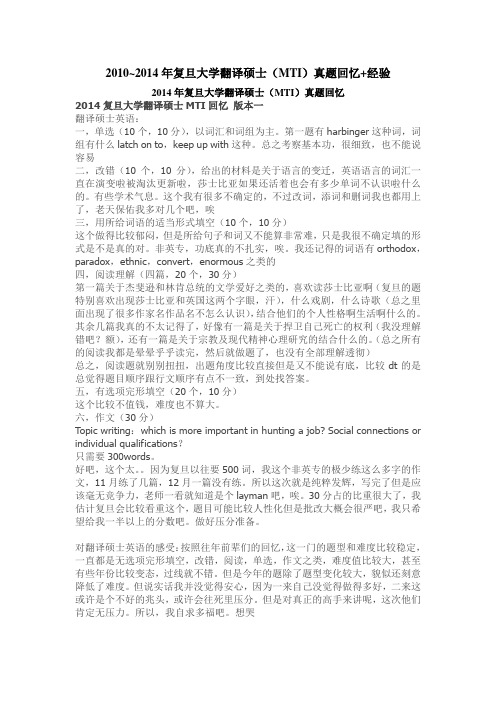
2010~2014年复旦大学翻译硕士(MTI)真题回忆+经验2014年复旦大学翻译硕士(MTI)真题回忆2014复旦大学翻译硕士MTI回忆版本一翻译硕士英语:一,单选(10个,10分),以词汇和词组为主。
第一题有harbinger这种词,词组有什么latch on to,keep up with这种。
总之考察基本功,很细致,也不能说容易二,改错(10个,10分),给出的材料是关于语言的变迁,英语语言的词汇一直在演变啦被淘汰更新啦,莎士比亚如果还活着也会有多少单词不认识啦什么的。
有些学术气息。
这个我有很多不确定的,不过改词,添词和删词我也都用上了,老天保佑我多对几个吧,唉三,用所给词语的适当形式填空(10个,10分)这个做得比较郁闷,但是所给句子和词又不能算非常难,只是我很不确定填的形式是不是真的对。
非英专,功底真的不扎实,唉。
我还记得的词语有orthodox,paradox,ethnic,convert,enormous之类的四,阅读理解(四篇,20个,30分)第一篇关于杰斐逊和林肯总统的文学爱好之类的,喜欢读莎士比亚啊(复旦的题特别喜欢出现莎士比亚和英国这两个字眼,汗),什么戏剧,什么诗歌(总之里面出现了很多作家名作品名不怎么认识),结合他们的个人性格啊生活啊什么的。
其余几篇我真的不太记得了,好像有一篇是关于捍卫自己死亡的权利(我没理解错吧?额),还有一篇是关于宗教及现代精神心理研究的结合什么的。
(总之所有的阅读我都是晕晕乎乎读完,然后就做题了,也没有全部理解透彻)总之,阅读题就别别扭扭,出题角度比较直接但是又不能说有底,比较dt的是总觉得题目顺序跟行文顺序有点不一致,到处找答案。
五,有选项完形填空(20个,10分)这个比较不值钱,难度也不算大。
六,作文(30分)Topic writing:which is more important in hunting a job? Social connections or individual qualifications?只需要300words。
2017年全国硕士研究报告生入学统一考试英语二真题及答案解析
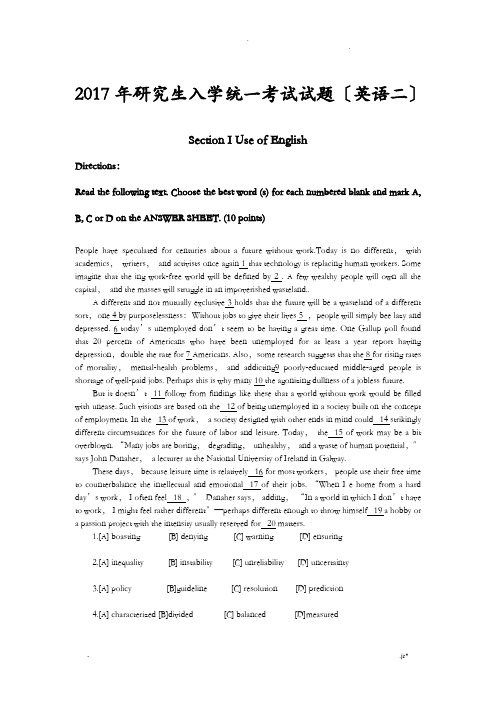
2017年研究生入学统一考试试题〔英语二〕Section I Use of EnglishDirections:Read the following text. Choose the best word (s) for each numbered blank and mark A, B, C or D on the ANSWER SHEET. (10 points)People have speculated for centuries about a future without work.Today is no different,with academics,writers,and activists once again 1 that technology is replacing human workers. Some imagine that the ing work-free world will be defined by 2 . A few wealthy people will own all the capital,and the masses will struggle in an impoverished wasteland..A different and not mutually exclusive 3 holds that the future will be a wasteland of a different sort,one 4 by purposelessness:Without jobs to give their lives 5 ,people will simply bee lazy and depressed. 6 today’s unemployed don’t seem to be having a great time. One Gallup poll found that 20 percent of Americans who have been unemployed for at least a year report having depression,double the rate for 7 Americans. Also,some research suggests that the 8 for rising rates of mortality,mental-health problems,and addicting9 poorly-educated middle-aged people is shortage of well-paid jobs. Perhaps this is why many 10 the agonizing dullness of a jobless future.But it doesn’t 11 follow from findings like these that a world without work would be filled with unease. Such visions are based on the 12 of being unemployed in a society built on the concept of employment. In the 13 of work,a society designed with other ends in mind could 14 strikingly different circumstances for the future of labor and leisure. Today,the 15 of work may be a bit overblown. “Many jobs are boring,degrading,unhealthy,and a waste of human potential,〞says John Danaher,a lecturer at the National University of Ireland in Galway.These days,because leisure time is relatively 16 for most workers,people use their free time to counterbalance the intellectual and emotional 17 of their jobs. “When I e home from a hard day’s work,I often feel 18 ,〞Danaher says,adding,“In a world in which I don’t have to work,I might feel rather different〞—perhaps different enough to throw himself 19 a hobby ora passion project with the intensity usually reserved for 20 matters.1.[A] boasting [B] denying [C] warning [D] ensuring2.[A] inequality [B] instability [C] unreliability [D] uncertainty3.[A] policy [B]guideline [C] resolution [D] prediction4.[A] characterized [B]divided [C] balanced [D]measured5.[A] wisdom [B] meaning [C] glory [D] freedom6.[A] Instead [B] Indeed [C] Thus [D] Nevertheless7.[A] rich [B] urban [C]working [D] educated8.[A] explanation [B] requirement [C] pensation [D] substitute9.[A] under [B] beyond [C] alongside [D] among10.[A] leave behind [B] make up [C] worry about [D] set aside11.[A] statistically [B] occasionally [C] necessarily [D] economically12.[A] chances [B] downsides [C] benefits [D] principles13.[A] absence [B] height [C] face [D] course14.[A] disturb [B] restore [C] exclude [D] yield15.[A] model [B] practice [C] virtue [D] hardship16.[A] tricky [B] lengthy [C] mysterious [D] scarce17.[A] demands [B] standards [C] qualities [D] threats18.[A] ignored [B] tired [C] confused [D] starved19.[A] off [B] against [C] behind [D] into20.[A] technological [B] professional [C] educational [D] interpersonalSection II Reading prehensionPart ADirections:Read the following four texts. Answer the questions below each text by choosing A, B, C or D. Mark your answers on the ANSWER SHEET. 〔40 points〕Text 1Every Saturday morning, at 9 am, more than 50,000 runners set off to run 5km around their local park. The Parkrun phenomenon began with a dozen friends and has inspired 400 events in the UK and more abroad. Events are free, staffed by thousands of volunteers. Runners range from four years old to grandparents; their times range from Andrew Baddeley's world record 13 minutes 48 seconds up to an hour.Parkrun is succeeding where London's Olympic "legacy" is failing. Ten years ago on Monday, it was announced that the Games of the 30th Olympiad would be in London. Planning documents pledged that the great legacy of the Games would be to level a nation of sport lovers away from their couches. The population would be fitter, healthier and produce more winners. It has not happened. The number of adults doing weekly sport did rise, by nearly 2 million in the run-up to 2012-but the general population was growing faster. Worse, the numbers are now falling at an accelerating rate. The opposition claims primary school pupils doing at least two hours of sport a week have nearly halved. Obesity has risen among adults and children. Official retrospections continue as to why London 2012 failed to "inspire a generation." The success of Parkrun offers answers.Parkun is not a race but a time trial: Your only petitor is the clock. The ethos weles anybody. There is as much joy over a puffed-out first-timer being clapped over the line as there is about top talent shining. The Olympic bidders, by contrast, wanted to get more people doing sports and to produce more elite athletes. The dual aim was mixed up: The stress on success over taking part was intimidating for newers.Indeed, there is something a little absurd in the state getting involved in the planning ofsuch a fundamentally "grassroots", concept as munity sports associations. If there is a role for government, it should really be getting involved in providing mon goods-making sure there is space for playing fields and the money to pave tennis and netball courts, and encouraging the provision of all these activities in schools. But successive governments have presided over selling green spaces, squeezing money from local authorities and declining attention on sport in education. Instead of wordy, worthy strategies, future governments need to do more to provide the conditions for sport to thrive. Or at least not make them worse.21. According to Paragraph1, Parkrun has_____.A.gained great popularityB.created many jobsC.strengthened munity tiesD.bee an official festival22. The author believes that London's Olympic "legacy" has failed to_____. A.boost population growthB.promote sport participationC.improve the city's imageD.increase sport hours in schools23. Parkrun is different from Olympic games in that it_____.A.aims at discovering talentsB.focuses on mass petitionC.does not emphasize elitismD.does not attract first-timers24. With regard to mass sport, the author holds that governments should_____. A.organize "grassroots" sports eventsB.supervise local sports associationsC.increase funds for sports clubsD.invest in public sports facilities25. The author's attitude to what UK governments have done for sports is_____. A.tolerantB.criticalC.uncertainD.sympatheticText 2With so much focus on children’s use of screens, it's easy for parents to forget about their own screen use. “Tech is designed to really suck on you in,〞says Jenny Radesky in her study of digital play, "and digital products are there to promote maximalengagement. It makes it hard to disengage, and leads to a lot of bleed-over into the family routine.〞Radesky has studied the use of mobile phones and tablets at mealtimes by giving mother-child pairs a food-testing exercise. She found that mothers who sued devices during the exercise started 20 percent fewer verbal and 39 percent fewer nonverbal interactions with their children. During a separate observation, she saw that phones became a source of tension in the family. Parents would be looking at their emails while the children would be making excited bids for their attention.Infants are wired to look at parents’ faces to try to understand their world, and if those faces are blank and unresponsive—as they often are when absorbed in a device-it can be extremely disconcerting foe the children. Radesky cites the “still face experiment〞devised by developmental psychologist Ed Tronick in the 1970s. In it, a mother is asked to interact with her child in a normal way before putting on a blank expression and not giving them any visual social feedback; The child bees increasingly distressed as she tries to capture her mother’s attention. "Parents don't have to be exquisitely parents at all times, but there needs to be a balance and parents need to be responsive and sensitive to a child’s verbal or nonverbal expressions of an emotional need," says Radesky.On the other hand, Tronick himself is concerned that the worries about kids' use of screens are born out of an “oppressive ideology th at demands that parents should always be interacting〞with their children: “It’s based on a somewhat fantasized, very white, very upper-middle-class ideology that says if you’re failing to expose your child to 30,000 words you are neglecting them.〞Tronick believes that just because achild isn’t learning from the screen doesn’t mean there’s no value to it-particularly if it gives parents time to have a shower, do housework or simply have a break from their child. Parents, he says, can get a lot out of using their devices to speak to a friend or get some work out of the way. This can make them feel happier, which lets then be more available to their child the rest of the time.26. According to Jenny Radesky, digital products are designed to ______. A.simplify routine mattersB.absorb user attentionC.better interpersonal relationsD.increase work efficiency27. Radesky’s food-testing exercise shows that mothers’ use of devices ______.A.takes away babies’ appetiteB.distracts children’s attentionC.slows do wn babies’ verbal developmentD.reduces mother-child munication28. Radesky’s cites the “still face experiment〞to show that _______.A.it is easy for children to get used to blank expressionsB.verbal expressions are unnecessary for emotional exchangeC.children are insensitive to changes in their parents’ moodD.parents need to respond to children's emotional needs29. The oppressive ideology mentioned by Tronick requires parents to_______. A.protect kids from exposure to wild fantasiesB.teach their kids at least 30,000 words a yearC.ensure constant interaction with their childrenD.remain concerned about kid's use of screens29.【答案】C【解析】此题目为具体细节题。
复旦大学翻译硕士考研真题及答案
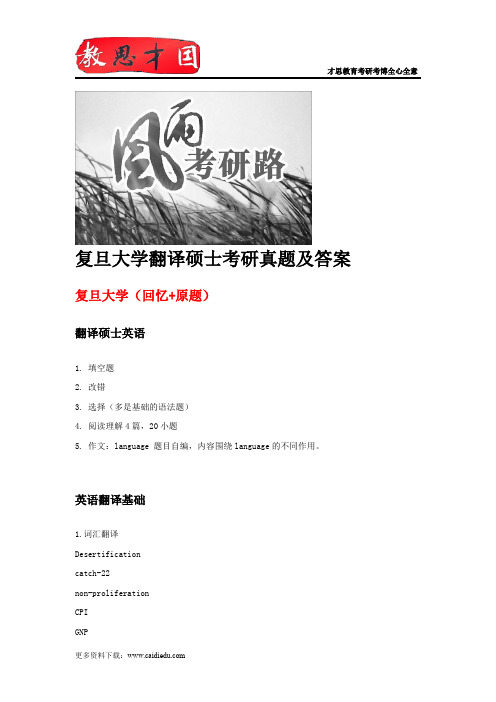
百科知识和汉语写作
1. 短语解释 David Cameron 论语 莎士比亚 神舟七号 上海世博会 G20(去年也考过) Euro Tunnel DNA 严复 次级贷款 君主立宪
更多资料下载:
才思教育考研考博全心全意
Encyclopaedia Britannica 奥巴马 经济全球化 Mayflower a nation on wheels 全球变暖 低碳经济 科学发展观 生态难民 超级细菌 蔡元培 2. 小作文两题可选 第一题是写扩招英语翻译专业学生的申请书 第二题是举办英语竞赛,向学生征稿的启事。 3. 大作文 针对一篇新闻报道写感想,报道是关于学生招聘会的,是在武汉的招聘会,有的学生不敢投 复旦北大这些学校,等等。题目自拟。
更多资料下载:
更多资料下载:
SOHO cyberspace industial dispute installment payment 双赢 安乐死 载人空间站 试管婴儿 试婚 闭路电视 收视率 物联网 2. 英译汉:说的是一个作家 3.汉译英:是中国文化吸收外来文化的题目
才思教育考研考博全心全意
才思教育考研考博全心全意
复旦大学翻译硕士考研真题及答案
复旦大学(回忆+3. 选择(多是基础的语法题) 4. 阅读理解 4 篇,20 小题 5. 作文:language 题目自编,内容围绕 language 的不同作用。
英语翻译基础
1.词汇翻译 Desertification catch-22 non-proliferation CPI GNP
2017年考研英语一翻译真题及答案解析
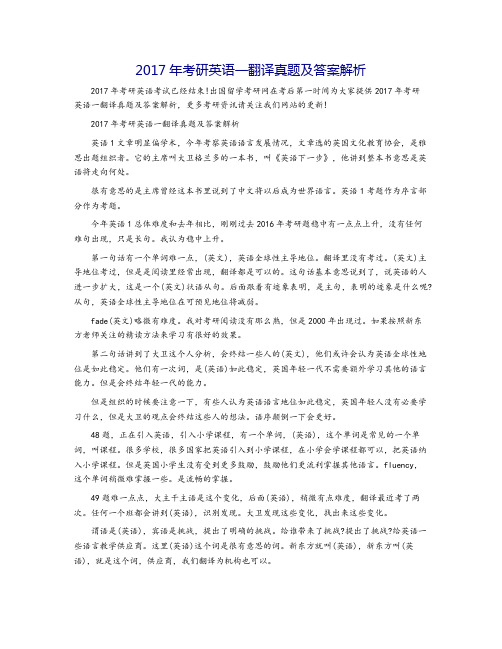
2017年考研英语一翻译真题及答案解析2017年考研英语考试已经结束!出国留学考研网在考后第一时间为大家提供2017年考研英语一翻译真题及答案解析,更多考研资讯请关注我们网站的更新!2017年考研英语一翻译真题及答案解析英语1文章明显偏学术,今年考察英语语言发展情况,文章选的英国文化教育协会,是雅思出题组织者。
它的主席叫大卫格兰多的一本书,叫《英语下一步》,他讲到整本书意思是英语将走向何处。
很有意思的是主席曾经这本书里说到了中文将以后成为世界语言。
英语1考题作为序言部分作为考题。
今年英语1总体难度和去年相比,刚刚过去2016年考研题稳中有一点点上升,没有任何难句出现,只是长句。
我认为稳中上升。
第一句话有一个单词难一点,(英文),英语全球性主导地位。
翻译里没有考过。
(英文)主导地位考过,但是是阅读里经常出现,翻译都是可以的。
这句话基本意思说到了,说英语的人进一步扩大,这是一个(英文)状语从句。
后面跟着有迹象表明,是主句,表明的迹象是什么呢?从句,英语全球性主导地位在可预见地位将减弱。
fade(英文)略微有难度。
我对考研阅读没有那么熟,但是2000年出现过。
如果按照新东方老师关注的精读方法来学习有很好的效果。
第二句话讲到了大卫这个人分析,会终结一些人的(英文),他们或许会认为英语全球性地位是如此稳定。
他们有一次词,是(英语)如此稳定,英国年轻一代不需要额外学习其他的语言能力。
但是会终结年轻一代的能力。
但是组织的时候要注意一下,有些人认为英语语言地位如此稳定,英国年轻人没有必要学习什么,但是大卫的观点会终结这些人的想法。
语序颠倒一下会更好。
48题,正在引入英语,引入小学课程,有一个单词,(英语),这个单词是常见的一个单词,叫课程。
很多学校,很多国家把英语引入到小学课程,在小学会学课程都可以,把英语纳入小学课程。
但是英国小学生没有受到更多鼓励,鼓励他们更流利掌握其他语言。
fluency,这个单词稍微难掌握一些。
2005-2017年历年考研英语二翻译真题
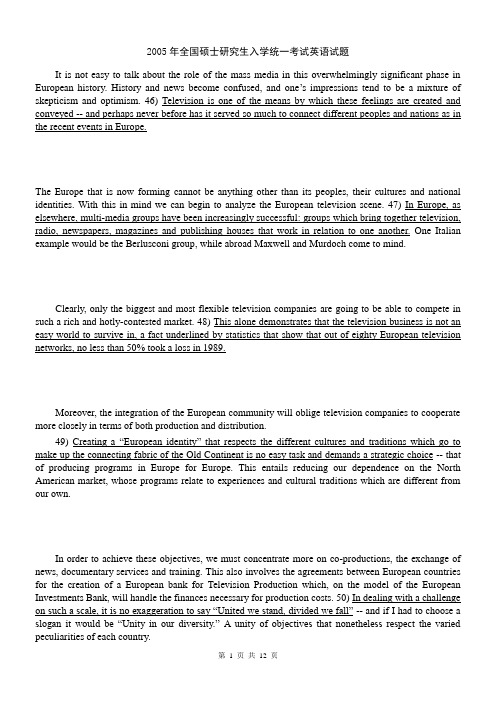
2005年全国硕士研究生入学统一考试英语试题It is not easy to talk about the role of the mass media in this overwhelmingly significant phase in European history. History and news become confused, and one’s impressions tend to be a mixture of skepticism and optimism. 46) Television is one of the means by which these feelings are created and conveyed -- and perhaps never before has it served so much to connect different peoples and nations as in the recent events in Europe.The Europe that is now forming cannot be anything other than its peoples, their cultures and national identities. With this in mind we can begin to analyze the European television scene. 47) In Europe, as elsewhere, multi-media groups have been increasingly successful: groups which bring together television, radio, newspapers, magazines and publishing houses that work in relation to one another. One Italian example would be the Berlusconi group, while abroad Maxwell and Murdoch come to mind.Clearly, only the biggest and most flexible television companies are going to be able to compete in such a rich and hotly-contested market. 48) This alone demonstrates that the television business is not an easy world to survive in, a fact underlined by statistics that show that out of eighty European television networks, no less than 50% took a loss in 1989.Moreover, the integration of the European community will oblige television companies to cooperate more closely in terms of both production and distribution.49) Creating a “European identity”that respects the different cultures and traditions which go to make up the connecting fabric of the Old Continent is no easy task and demands a strategic choice -- that of producing programs in Europe for Europe. This entails reducing our dependence on the North American market, whose programs relate to experiences and cultural traditions which are different from our own.In order to achieve these objectives, we must concentrate more on co-productions, the exchange of news, documentary services and training. This also involves the agreements between European countries for the creation of a European bank for Television Production which, on the model of the European Investments Bank, will handle the finances necessary for production costs. 50) In dealing with a challenge on such a scale, it is no exaggeration to say “Unit ed we stand, divided we fall” -- and if I had to choose a slogan it would be “Unity in our diversity.” A unity of objectives that nonetheless respect the varied2006年全国硕士研究生入学统一考试英语试题Is it true that the American intellectual is rejected and considered of no account in his society? I am going to suggest that it is not true. Father Bruckberger told part of the story when he observed that it is the intellectuals who have rejected America. But they have done more than that. They have grown dissatisfied with the role of intellectual. It is they, not America, who have become anti-intellectual.First, the object of our study pleads for definition. What is an intellectual? 46) I shall define him as an individual who has elected as his primary duty and pleasure in life the activity of thinking in a Socratic (苏格拉底) way about moral problems.He explores such problems consciously, articulately, and frankly, first by asking factual questions, then by asking moral questions, finally by suggesting action which seems appropriate in the light of the factual and moral information which he has obtained. 47) His function is analogous to that of a judge, who must accept the obligation of revealing in as obvious a manner as possible the course of reasoning which led him to his decision.This definition excludes many individuals usually referred to as intellectuals -- the average scientist, for one. 48) I have excluded him because, while his accomplishments may contribute to the solution of moral problems, he has not been charged with the task of approaching any but the factual aspects of those problems.Like other human beings, he encounters moral issues even in the everyday performance of his routine duties -- he is not supposed to cook his experiments, manufacture evidence, or doctor his reports. 49) But his primary task is not to think about the moral code which governs his activity, any more than a businessman is expected to dedicate his energies to an exploration of rules of conduct in business. During most of his waking life he will take his code for granted, as the businessman takes his ethics.The definition also excludes the majority of teachers, despite the fact that teaching has traditionally been the method whereby many intellectuals earn their living. 50) They may teach very well and more than earn their salaries, but most of them make little or no independent reflections on human problems which involve moral judgment.This description even fits the majority of eminent scholars. Being learned in some branch of human knowledge is one thing, living in "public and ill ustrious thoughts,” as Emerson would say, is something else.The study of law has been recognized for centuries as a basic intellectual discipline in European universities. However, only in recent years has it become a feature of undergraduate programs in Canadian universities. (46) Traditionally, legal learning has been viewed in such institutions as the special preserve of lawyers, rather than a necessary part of the intellectual equipment of an educated person.Happily, the older and more continental view of legal education is establishing itself in a number of Canadian universities and some have even begun to offer undergraduate degrees in law.If the study of law is beginning to establish itself as part and parcel of a general education, its aims and methods should appeal directly to journalism educators. Law is a discipline which encourages responsible judgment. On the one hand, it provides opportunities to analyze such ideas as justice, democracy and freedom. (47) On the other, it links these concepts to everyday realities in a manner which is parallel to the links journalists forge on a daily basis as they cover and comment on the news.For example, notions of evidence and fact, of basic rights and public interest are at work in the process of journalistic judgment and production just as in courts of law. Sharpening judgment by absorbing and reflecting on law is a desirable component of a journalist’s intellectual preparation for his or her career.(48) But the idea that the journalist must understand the law more profoundly than an ordinary citizen rests on an understanding of the established conventions and special responsibilities of the news media.Politics or, more broadly, the functioning of the state, is a major subject for journalists. The better informed they are about the way the state works, the better their reporting will be. (49) In fact, it is difficult to see how journalists who do not have a clear grasp of the basic features of the Canadian Constitution can do a competent job on political stories.Furthermore, the legal system and the events which occur within it are primary subjects for journalists. While the quality of legal journalism varies greatly, there is an undue reliance amongst many journalists on interpretations supplied to them by lawyers. (50) While comment and reaction from lawyers may enhance stories, it is preferable for journalists to rely on their own notions of significance and make their own judgments. These can only come from a well-grounded understanding of the legal system.Directions:Read the following text carefully and then translate the underlined segments into Chinese. Your translation should be written carefully on ANSWER SHEET 2. (10 points)In his autobiography, Darwin himself speaks of his intellectual powers with extraordinary modesty. He points out that he always experienced much difficulty in expressing himself clearly and concisely, but (46) he believes that this very difficulty may have had the compensating advantage of forcing him to think long and intently about every sentence, and thus enabling him to detect errors in reasoning and in his own observations.He disclaimed the possession of any great quickness of apprehension or wit, such as distinguished Huxley.(47) He asserted, also, that his power to follow a long and purely abstract train of thought was very limited, for which reason he felt certain that he never could have succeeded with mathematics.His memory, too, he described as extensive, but hazy. So poor in one sense was it that he never could remember for more than a few days a single date or a line of poetry. (48) On the other hand, he did not accept as well founded the charge made by some of his critics that, while he was a good observer, he had no power of reasoning.This, he thought, could not be true, because the “Origin of Species”is one long argument from the beginning to the end, and has convinced many able men. No one, he submits, could have written it without possessing some power of reasoning. He was willing to assert that “I have a fair share of invention, and of common sense or judgment, such as every fairly successful lawyer or doctor must have, but not, I believe, in any higher degree.”(49) He adds humbly that perhaps he was “superior to the common run of men in noticing things which easily escape attention, and in observing them carefully.”Writing in the last year of his life, he expressed the opinion that in two or three respects his mind had changed during the preceding twenty or thirty years. Up to the age of thirty or beyond it poetry of many kinds gave him great pleasure. Formerly, too, pictures had given him considerable, and music very great, delight. In 1881, however, he said: “Now for many years I cannot endure to read a line of poetry. I have also almost lost my taste for pictures or music.” (50) Darwin was convinced that the loss of these tastes was not only a loss of happiness, but might possibly be injurious to the intellect, and more probably to the moral character.2009年全国硕士研究生入学统一考试Directions:Read the following text carefully and then translate the underlined segments into Chinese. Your translation should be written carefully on ANSWER SHEET 2. (10 points)There is a marked difference between the education which every one gets from living with others, and the deliberate educating of the young. In the former case the education is incidental; it is natural and important, but it is not the express reason of the association.46It may be said that the measure of the worth of any social institution is its effect in enlarging and improving experience; but this effect is not a part of its original motive.Religious associations began, for example, in the desire to secure the favor of overruling powers and to ward off evil influences; family life in the desire to gratify appetites and secure family perpetuity; systematic labor, for the most part, because of enslavement to others, etc. 47Only gradually was the by-product of the institution noted, and only more gradually still was this effect considered as a directive factor in the conduct of the institution.Even today, in our industrial life, apart from certain values of industriousness and thrift, the intellectual and emotional reaction of the forms of human association under which the world's work is carried on receives little attention as compared with physical output.But in dealing with the young, the fact of association itself as an immediate human fact, gains in importance.48 While it is easy to ignore in our contact with them the effect of our acts upon their disposition, it is not so easy as in dealing with adults.The need of training is too evident; the pressure to accomplish a change in their attitude and habits is too urgent to leave these consequences wholly out of account. 49Since our chief business with them is to enable them to share in a common life we cannot help considering whether or no we are forming the powers which will secure this ability.If humanity has made some headway in realizing that the ultimate value of every institution is its distinctively human effect we may well believe that this lesson has been learned largely through dealings with the young.50 We are thus led to distinguish, within the broad educational process which we have been so far considering, a more formal kind of education -- that of direct tuition or schooling. In undeveloped social groups, we find very little formal teaching and training. These groups mainly rely for instilling needed dispositions into the young upon the same sort of association which keeps the adults loyal to their group.2010年全国硕士研究生入学统一考试(英语二)46.Directions:In this section there is a text in English .Translate it into Chinese. Write your translation on ANSWER SHEET2.(15points)“Suatainability” has become apopul ar word these days, but to Ted Ning, the concept will always have personal meaning. Having endured apainful period of unsustainability in his own life made itclear to him that sustainability-oriented values must be expressed though everyday action and choice.Ning recalls spending aconfusing year in the late 1990s selling insurance. He’d been though the dot-com boom and burst and,desperate for ajob,signed on with a Boulder agency.It didin’t go well. “It was a really had move because that’s not my passion,” says Ning, whose dilemma about the job translated, predictably, into a lack of sales. “I was miserable, I had so much anxiety that I would wake up in the middle of the night and stare at the ceiling. I had no money and needed the job. Everyone sai d, ‘Just wait, you’ll trun the corner, give it some time.’”Section Ⅲ Translation最近,“承受力”\坚持不懈”成了一个流行词,但对Ted Ning来说,他对其含义有自己亲身的体会。
2012年上海复旦大学考研翻译硕士真题回忆版
2012年上海复旦大学考研翻译硕士真题回忆版1,政治(1)12年的题真的有些偏了,我真的认为像是清ZF跟美法签订了哪些条约,像是洋务运动创办了哪些学堂啥的,没有啥出的必要。
还有大题,觉得最重点的新型工业化道路,经济转型,居然也没考。
(2)马哲得先死背,再活用。
毛特总之就那几句话,初级阶段国情啦,发展生产力的需要啦,人民生活水平啦,综合国力啦,在从政治经济文化方面分析分析。
近现代史也没啥可说的,死记呗,各种会议。
(3)思修和法基占得分值也不太多,知识点也不太难,理解就好,注意跟前面的知识结合。
详情请见2012年考研政治真题及解析。
2,翻译硕士英语,题型同前几年一样。
(1)无选项完型20题共20分(2)单词替换20题共20分(3)改错20题共20分(4)单选20题共10分(5)阅读四篇20题共10分(6)写作500words30分。
无选项完型出的很基础,也没有太多生僻词,但是毕竟是无选项的,所以大家一定得多做练习,培养语感以及整体连贯性,扩充词汇量。
单词替换就是给一篇文章,然后文章里有20个粗体词,每个词给你四个近义词,让你选最接近,最合适的一个。
词量不小,难度也不太小,主要考察近义词辨析,要平时多注意。
改错也不太难,平时多练练就ok,这次考的是关于自动牙刷的。
单选是全考语法的,不简单,大概有虚拟语气,独立主格结构啥的。
阅读也还好,词汇不是很难,不过值得一提的是,复旦这次出的专硕翻译实在有一点对付,听有人说有拼写错误,我是没注意到,不过阅读题里有两道题一摸一样我就无法忍受了。
写作是问你高考制度有没有助于提高学术水平科研成果啥的。
3,英语翻译基础,是真的太基础啦。
①词汇翻译,一共十个,大学城,收视率,试婚,载人空间站,human genome project,crowdsourcing,party animal,catch-22(ms连考三年了已经)剩下2个不记得了,不过都是很基础的。
大部分都是原题啊。
复旦大学翻译硕士考研真题经验参考书
在下定决心准备考研的时候我也很迷茫;不知道自己要看什么书;还有复习计划要怎么做..其实当你看了很多网上的帖子之后;你就可以摸索出自己的很多学习方式了..再回头看的时候;对于自己的考研;不会有强烈的成就感;因为坚持;就可以胜利;只要坚持;你就可以只要坚持;你一定行现在回想起来;其实只要有一个计划并一直按那个在进步;最终一定能考上..所以同学们;不要着急;不要害怕;自己永远是力量的源泉;是智慧的源泉;当你不知道怎么做的时候;来坛子里看看;通常启发就来了;解决完问题;进步;提升送大家一句话:相信自己;力量在心中首先我们在决定考研之后要先了解目标学校的考试内容是什么;有些学校对的翻硕要考二外;复旦其实对翻硕没有什么要求..复旦的考试分为四个部分:其中;英语翻译基础、翻译硕士英语和汉语百科知识与写作是自主命题;政治是全国统考..我是从3月份开始备考的;当时主要的精力都放在了专科课上面;政治的复习也是在考试前10月分开始复习的..接下来跟大家分享一下我各科的复习经验..翻译硕士英语题型为:词汇语法选择<20分;20题>;改错<10分;10题>;阅读理解<40分;两篇为选择题;两篇回答问题>;命题作文<30分>试题难度在六级以上、专八以下;词汇语法可以用专四词语与语法专项来练习;改错为专八难度;阅读理解六级难度左右;作文不少于400字;专八难度..我复习的时候选择的是英语专业八级词汇轻松背;里面的英文词汇达到1万到2万..单词的巩固是英语复习的关键..作文我主要是背了很多星火专八的例文..翻译基础主要考的是词语翻译;英汉互译..短词翻译主要考察的是缩略语、专业术语翻译、热点词翻译..大家可以多专注一下真题里的短语;还可以在学校论坛里找一些资料..英汉互译建议大家可以练习专八翻译;如果时间允许的情况下;可以看张培基的英译中国现代散文选然后一定要自己翻译;而且要写在本上..我推荐:ChinaDaily的新词新译;CATTI3笔译实务;散文108..汉译英大家多看看背背张培基的英译散文选就行了..翻译我主要用的书是:上外的高级翻译教程;英汉翻译简明教程;;张培基的英译中国现代散文选..这些书都要反复的翻译;还要坚持每天都要练习翻译..汉语写作与百科知识百科需要大家关注的是国内外新闻还有热点名词;复旦大学的考试比较喜欢考这个方向的;所以需要大家多关注这些信息..而且复旦的名词解释每年考试都会有大量重复的;莎士比亚更是每年都考..而且还经常考英国;所以就需要我们掌握英国的基本情况和发展历史;国歌天佑女王、民族央格鲁撒克逊、别称日不落帝国、名人莎士比亚;湖畔诗人、历史事件工业革命;资产阶级革命;圈地运动;鸦片战争、制度君主立宪、代表BBC;大英百科全书等等;你会发现以上列出的条目全是考过的题目..写作方面同样要多借鉴往年的真题作文;因为复旦每年的考试类型都比较接近;所以要把历年的考试类型都要吃透;然后自己多练习就好了..可以看看蛋核的写作课程..下面就给大家附上我备考时候用的英语专业八级历年真题;GRE试题阅读理解部分西方文化史;庄锡昌;北京:高等教育出版社英语写作手册;丁往道;北京:外语教学与研究出版社实用翻译教程增订本;冯庆华;上海:上海外语教育出版社笔译理论与技巧;何刚强;北京:外语教学与研究出版社英汉翻译简明教程;庄绎传;北京:外语教学与研究出版社;2002英译中国现代散文选1-3册;张培基;上海:上海外语教育出版社法律文本与法律翻译;李克兴;中国出版集团中国对外翻译出版社英语笔译实务三级全国翻译专业资格水平考试教材;外文出版社政治是我考研当中考的最差的一门了;这主要是因为我复习时太大意了;很多前辈都说政治不用太早开始复习;但是依我看大家千万不要开始太晚了..我是从九月中旬开始复习政治的;整整一个月看精讲精练、做配套习题以及听视频课;说真的听政治视频真的挺重要的;其中马原和毛中特的知识不听讲解;非常难懂;这样多选题会模棱两可、一塌糊涂..十月份和十一月份我基本都在听强化课程;参考书我买了那本非常火热的政治新时器;先是把真题按照年份倒序着做;然后又刷了一遍李凡的题..到了十二月份进入了冲刺阶段我买了很多套测试卷;各种老师的都有主要是用来做选择题;而大题我就只背了李凡系列..我之所以政治考的不算很好;主要是因为开始的时候盲目自信;所以政治复习开始的比较晚;结果考研政治相比高中的政治要深不少;而且内容量也不小..这里我还是建议大家所以最好7月份就开始;我9月份才学就导致后期手忙脚乱;临考头一天晚上还在大背;根本没有时间做反思与总结..政治要多注意多选题;多做总结、对比、思考;这是拉开差距的关键一环..另外一定要多关注新闻时事..复习的时候大家千万不要存下侥幸心理不要觉得之歌知识点自己以前学的很好;就对它懈怠了;大家一定更要脚踏实地的从基础知识开始复习准备的越充分;考试的时候就会越不辜负自己所望..所以请大家相信;天道酬勤四个字..如果最后用一个词来总结我的考研之路;那一定会是——坚持..加油;祝福你们都能圆梦复旦大学最后;还想要说的是;考研不易;我手中还有一些考研资料;包括历年真题、一些笔记、专业课视频等;都可以免费分享给大家;大家可以下载high研app;在上面找我..。
上海复旦大学考研翻硕MTI初试经验分享
上海复旦大学考研翻硕MTI经验分享一、个人情况说明看到复试通过,终于释然了,答应了很多人写篇经验贴,不能爽约。
先说说本人情况吧,浙江某普通二本新闻专业,标准文科男,大学基本与英语绝缘,基础还行,六级裸考578,毕业不想搞新闻,加上自己对英语和翻译挺感兴趣的,于是转投MTI。
一开始择校范围定在北上广,综合考量之后确定上海,于是就定在同济、复旦、交大和上外中的一所。
以为同济理工科学校会好考一点,就初定同济。
准备了一段时间之后才发现太傻太天真,同济因为有刘宓庆大牛在,翻译门槛超高,各种考你翻译理论翻译批评,没事考个古文翻译直接吐血,果断放弃。
研究了一下四所学校的真题之后,发现复旦最对我胃口,就定在复旦了(其实说到底还是因为“害人不浅”的名校情结)。
闲话不多说,直接上干货。
二、关于初试1、政治。
我没报班,因为我觉得关键看你自己。
9月份才开始不紧不慢地看,跟着肖秀荣一路走到考场。
如果你时间富裕,可以先看知识点再刷题,如果没空,直接刷题也未尝不可,身边这两种人都有,最后都考得还行,总之刷题背题是必不可少的,特别是选择题,只要选择题正确率有保证,政治铁定不差,我1000题刷了5遍,错题一定要摸透,同时要好好研究一下大题的答题技巧和思路。
今年老肖压中了俩,也算不错了,毕竟今年这么反压题。
不要太把政治当回事,一开始就看我觉得不明智,最重要的还是你的专业课,当然也别当儿戏,一点一滴积累起来就行了。
我的备考资料:肖秀荣全套(自己挑着买吧,1000题,肖八,肖四等长青款必备)2、翻硕英语:这个真不好说,难度有变,前几年很难,从去年开始难度明显下降,今年和去年应该持平,10分的选择题看你自己词汇量和短语的积累,10分改错也不算太难,专八难度,阅读做傻了,以为在做6级,感觉这40分是在白送,完形今年没有,这10分加到了作文上,40分的作文还是挺重要的,关键今年居然出的原题,也是醉了。
所以考85真不是个人水平有多高,是因为今年压根没打算为难你。
翻译硕士MTI考试各高校真题汇总
MTI真题汇总2011史上最全MTI真题汇总-百科-应用文-翻译基础2011北师大翻译硕士MTI真题回忆版2011年外国语大学翻译硕士英语翻译基础真题回忆2011年语言大学翻译硕士真题回忆版11外经贸真题2011对外经济贸易大学翻译硕士考研历程回顾2011年中国石油大学英语翻译硕士真题回忆2011东北大学翻译硕士MTI真题回忆2011师大学MTI真题2011年大学MTI真题2011大学MTI考生回忆帖2011年大学翻译硕士MTI入学考试真题回忆版本2011年师大学翻译硕士(MTI)真题回忆北二外英语MTI试题2011 大学MTI考研真题2011年广外MTI真题回忆+解析+备考经验2011年上交翻译硕士MTI真题回忆2011年外国语大学翻硕MTI百科知识考研2011西外MTI复试2011年川外翻译硕士MTI真题回忆版2011大学翻译硕士初试真题2011年大学翻译硕士复试容2011大学翻译硕士初试真题2010-2011复旦大学MTI真题2011北二外MTI2011年大学翻译硕士MTI真题回忆2011年大学翻译硕士真题回忆2011年大学翻译硕士MTI真题回顾2011年师大学翻译硕士MTI考研回忆2011年西南大学翻译硕士部分真题回忆2011南开大学翻译硕士汉语写作与百科知识2011南开大学翻译硕士MTI翻译基础2011年南开大学翻译硕士MTI真题回忆2011年暨南大学翻硕真题回忆2011年师大翻译硕士MTI真题回忆版2011年东南大学翻译硕士(MTI)真题回忆及备考经验2011年华东师大MTI真题回忆及考后经验2011年大学外国语学院英语语言文学基础英语汉译英试题2011年百科知识题型统计2011年大学翻译硕士MTI考试真题回忆版2011年各高校英汉特色词语翻译!最强完整版!2011天津外国语翻译硕士(笔译方向)真题2011年海事大学翻译硕士英语真题回忆2011年师大翻译硕士MTI真题回忆厦大2011MTI初复试+复习书目翻译硕士MTI各院校真题作文汇总2010年大学翻译硕士考研试题大学2010翻译硕士试题回顾2010 第二外国语学院MTI真题2010年外国语大学翻译硕士考研试题2010年北语MTI英语笔译真题2010年北航翻译硕士考研试题北航2010年真题大学MTI试题回忆天外MTI初试及复试经验帖川大2010翻译硕士原题对外经贸易2010年翻译硕士初试对外翻译硕士真题2010贸大MTI复试2010复旦大学MTI初试复试2010年华中师大学MTI真题2010大学MTI试题2010年南开大学MTI真题大学2010MTI考研大学2010年MTI真题回忆2010年大学翻译硕士试题2010年上外翻译硕士考研复试试题大学2010年MTI真题回忆同济大学2010翻译硕士题目回忆同济大学2010翻译硕士题目回忆2010年西外MTI汉语百科与写作2010中国海洋大学MTI真题回忆2010年中南大学MTI业课回忆2010中南大学MTI英汉互译回忆2011年中南大学翻译硕士(MTI)考研试题(回忆版)2010大学MTI英语翻译基础2010大学MTI英语翻译基础2010大学汉语写作与百科知识2010年交通大学翻译硕士(MTI)年真题回忆翻译硕士2010汉语写作大作文各高校回忆集外国语大学2009年翻译专业硕士MTI笔试真题WORD下载2010各校MTI分数线MTI笔译教材方华文:20世纪中国翻译史[完整] DJVU高华丽:中外翻译简史[2009] DJVU景华:译者的隐形•翻译史论文革:西方翻译理论流派研究[2004]景华:翻译伦理•韦努蒂翻译思想研究长栓:非文学翻译理论与实践外语教育-宏薇-新编汉英翻译教程下载《大学英汉翻译教程》(第三版),对外经济贸易,王恩冕交替传译笔记:速成课程DJVU王振国:新英汉翻译教程教师用书[2007][完整] DJVU外教社翻译硕士专业(MTI)系列教材和平:笔译训练指南钱歌川-翻译的技巧-写作材料.doc钱歌川:《翻译的技巧》钱歌川《英文疑难详解》、《英文疑难详解续》郭延礼:文学经典的翻译与解读[2007][完整]金焕荣:商务英语翻译铁路工程翻译相关方面的书籍MTI--物流英语其中:英汉新闻翻译[2009][完整] DJVU英文原版翻译书籍库存翻译生态学MTI口译教材【翻译硕士】MTI教材之- 同声传译配套MP3【口译原版】James Nolan:Interpretation: Techniques and Exercises 【口译原版】Phyllis Zatlin:Thearical Translation and FilmAdaptation[2005][T]军峰:《商务英语口译》(第二版)DjVu格式基础英语资料汇总《英美散文选读》(一),对外经济贸易大学,显璟《英美散文选读》(二),对外经济贸易大学,显璟庄锡昌:西方文化史[2003][正文可检索]常磊:英美文化博览荣启:文学语言学[2005][完整]王佐良:英国散文的流变[1998]培基英译中国现代散文选MTI--希腊文学简史外研社现代大学英语学生用书1-6 教师用书1-6存军:当今流行英语缩略语[2007][完整] DJVU百科资料汇总福田:中国文化小百科(一)福田:中国文化小百科(二)福田:中国文化小百科(三)钱光培:中国文学百科知识手册丁:中国文化小百科全书(4卷)当代中国文化百科全书(英文原版)当代英国文化百科全书(英文原版)王德友:中国文化百科[缺]贾宝珍:新世纪文化百科[正文可检索]程裕祯:中国文化要略(第二版)[2003]金元浦:中国文化概论[2007][完整] DJVU现代汉语与百科知识.doc翻译硕士百科知识语文常识《中国文学与中国文化知识应试指南》,东南大学,林青松不可不知的2000个文化常识PDF/DJVUMTI考试名词翻译及汉语名词解释.doc王长华:大学语文[2009][完整] DJVUMTI--环境保护专题应用文公文写作书籍10本应用文写作奉送(备忘录+广告+会议通知+商务信函+说明书)夏晓鸣:应用文写作【2007】《公文写作》《公文写作》,对外经济贸易,白延庆文国:中文读写教程第1、2册常用词典汇总汉英中国文化词典《牛津英美文化词典》《中国翻译家辞典》正文可搜索PDF林煌天:《中国翻译词典》PDF《牛津高阶英汉双解词典》第7版谭载喜主译:翻译研究词典[完整] DJVU Dictionary of Translation Studies.rar 《最新汉英特色词汇词典》(第五版)许鲁之:简明英美文化词典[2000]汪榕培:英语学习背景知识词典.pdf王斌华:口笔译高频词汇词典[2010]最新汉英特色词汇(第四版)英语搭配大辞典__英汉对照牛津英语搭配词典__英汉双解版英汉双解美国习语词典__第4版。
- 1、下载文档前请自行甄别文档内容的完整性,平台不提供额外的编辑、内容补充、找答案等附加服务。
- 2、"仅部分预览"的文档,不可在线预览部分如存在完整性等问题,可反馈申请退款(可完整预览的文档不适用该条件!)。
- 3、如文档侵犯您的权益,请联系客服反馈,我们会尽快为您处理(人工客服工作时间:9:00-18:30)。
才思学员回忆--2017年复旦大学翻译硕士考研真题
一、翻译硕士英语
1词汇。
10个单选基本都是词汇、词组,记得的第一个题有unwreath,unstring,unravel,unzip,还有harbinger, observer,live up to……
2改错。
10个
3阅读。
4篇,20个
4完型。
20个,完型今年题型也变了,有选项
5写作。
A little knowlege is a dangerous thing.(考完第一天我就很没出息地在论坛里哭诉,实在是羞耻,sorry...)
二、英语翻译基础
1英译汉。
Sunday before the war(战后星期天,刚刚查的)考的是前两段,网上一搜就有陆谷孙先生的译文。
2汉译英。
“一带一路”(......)
三、百科和写作
1长城修建于哪个朝代
2中国历史上哪两个朝代是由外族统治的
3中国古代两位思想家及其代表作
4四大发明
5文房四宝
6孟子的英译名
7辛亥革命发生于哪个年代
8国家公祭日
9香港回归是哪一年
10李白杜甫的代表作各一首
11史记作者
12十三五规划的起止年份
13第五版人民币单位是哪个汉字
14两会政府报告中“大众创业”的后一句是什么
15红楼梦英译版前80回是哪个英国学者翻译的
16北京和张家口将在哪一年共同举办什么国际赛事
17Strange stories from a Chinese Studio是哪部作品18The art of war是哪部中国著作
19All men are brothers是中国哪部著作的英译名,译者是谁
20Science knows no country的中文翻译
21Those who labour with mind rule,those who labour are ruled中文是哪句话
22牛顿万有引力定律的英文
23德国物理学家伦琴发现了什么获得了诺贝尔物理学奖
24UFO的全称
25MTI的全称
自己回忆了一下,结合了论坛里小伙伴的,25个应该全了。
(题型也变了,前几年都是名词解释)
(二)应用文
“翻译与跨文化交际”研讨会,写通知。
(去年还是前年的原题)
(三)大作文
关于传播中华文化,提升文艺作品阿之类的讲话,里面也有关于翻译的,然后写800-1000字的评论。
